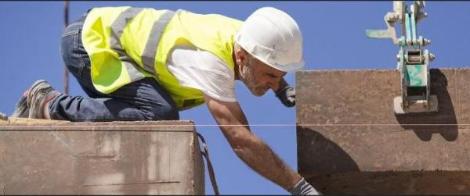Construction: Filiater transforms construction waste into building blocks
April 2025
Agence pour l’Environnement et la Maîtrise de l’Energie (ADEME)
Faced with the sheer volume of waste generated by the construction industry, Nice-based company Filiater is focusing on recycling construction waste. Using mobile machines, it transforms excavated soil directly on site into ultra-strong, low-carbon building blocks. This solution is supported by ADEME and Bpifrance and has already been tested on a large scale.

Ultra-strong raw earth blocks
In France, the construction industry generates 227 million tonnes of waste every year, most of which comes from construction waste. The Nice-based company Filiater recycles this resource, consisting of earth and rubble, into raw material for the building industry. ‘We have designed two machines that compress the earth very firmly into building blocks,’ explains Michel Oggero, the company’s founder and current CEO. These blocks, which weigh between 220 and 350 kg depending on the case, are made from soil excavated on site. ‘Our machines are mobile factories that move directly to the construction site to avoid back-and-forth trips in semi-trailers,’ continues Michel Oggero. This saves time and money, but also reduces greenhouse gas emissions.
€3.7 million invested by ADEME
‘Raw earth is widely available throughout the country and the environmental impact of this material, which contains no binders, is much better than concrete,’ notes Philippe Leonardon, an engineer in ADEME’s building department. Convinced of the future potential of this process for the construction industry, ADEME has supported Filiater on several occasions: first in 2017 for the TERVA experimental project, which enabled the company to make progress on R&D issues. Then in 2020, as part of the RRVDB (Reduction, Recycling and Recovery of Construction Waste) call for projects, the Agency invested €3.7 million in Filiater’s second project: MacroTerre. What’s on the agenda? A prototype mobile factory in 2021, which has enabled the construction of the first performance demonstrator: a multidisciplinary healthcare centre in Charleval, in the Bouches-du-Rhône region, due to be delivered in February 2024. This building, constructed under operational conditions, has demonstrated the technical, environmental and economic efficiency of the Nice-based company’s construction method. The company is also working on other construction projects in Nice and Marseille. However, as the machine requires two semi-trailers to be moved to the construction site, Filiater is currently focusing on large-scale projects such as housing developments and large buildings of 1,500 m² or more.
Savings in raw materials
By using earth excavated directly on site, Filiater offers a low-carbon alternative to concrete. For example, the earth construction of the multidisciplinary health centre in Charleval saved 45 tonnes of steel, 396 tonnes of aggregates and 159 tonnes of sand, not to mention the savings made on semi-trailer journeys to and from the landfill site for rubble. Compared to concrete, the Filiater construction method reduces CO2 emissions by 40 to 80%, air and water pollution by 75% and grey energy, i.e. the energy consumed during the material’s life cycle, by 60 to 90%.
Machines of all sizes throughout France
Filiater is currently developing two new mobile plants: the first, scheduled for completion at the end of 2025, will produce small bricks. The second, which will be ready at the end of 2026, will manufacture large blocks weighing up to 2 tonnes and measuring 2 metres in length. This will save time during installation and will be used for large industrial buildings and various outdoor developments. In parallel with the development of this new equipment, Filiater has been named the 2024 winner of the ‘Première Usine’ scheme run by Bpifrance. ‘We received this award for our FIRMATER project, which aims to set up at least one mobile factory per region,’ explains the manager. By 2030, the company aims to deploy 12 raw earth block production units across France.